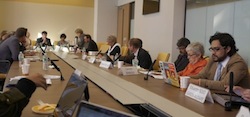Independent Expert Group on a data revolution for sustainable development – civil society outreach day
 Sunday, October 12, 2014 at 3:48PM
Sunday, October 12, 2014 at 3:48PM The Independent Expert Advisory Group (IEAG) held a ‘town hall event’ on 26 September, as well as in-depth sessions centered around specific topics of the data revolution with members of civil society, academia and the private sector. These served as a “listening session” for IEAG members, with representatives from over 60 civil society organizations in attendance.
Open data and accountability
 Independent Expert Advisory Group (IEAG) Town HallMaking data more open, potentially through Freedom of Information Acts, was one of the main issues discussed in this session. It was noted that even when these laws exist, they are often not implemented. It was generally agreed that data that is not confidential should be openly available. One big issue identified was the capacity of people to find and understand the data that exists.
Independent Expert Advisory Group (IEAG) Town HallMaking data more open, potentially through Freedom of Information Acts, was one of the main issues discussed in this session. It was noted that even when these laws exist, they are often not implemented. It was generally agreed that data that is not confidential should be openly available. One big issue identified was the capacity of people to find and understand the data that exists.
In discussing possible open data standards created on the international level, the Open Government Partnership could be used as a model. There was a concern that when open data is discussed there is the risk of spreading data that is not high quality. A potential solution could be creating some sort of audit agency for open data and statistics. (The European Union currently has something similar in place with an audit conducted every five years.) Many of the members emphasized that such an audit must be done by an independent organization. Overall there was consensus that there is a need for more open data, but that in order to make this a reality it must be of a high quality and that there is accountability of the data producers to protect confidentiality and privacy concerns.
Measuring the sustainable development goals
This session was designed to discuss how the data revolution can be leveraged to make measurement of the SDGs more feasible. Some civil society participants stated that there will be a need to move beyond quantitative indicators to more qualitative measures for measuring human rights-based targets. There was a strong point made that a lot of data currently exists but is not shared. For instance, many NGOs collect survey data at the local level but this is not shared with National Statistical Offices (NSOs) or government agencies. Participants stressed that the need for better coordination amongst a wide range of partners, which could go a long way to improving the measurement of the SDGs.
The importance of inclusiveness was discussed in relation to gathering data. Many times people or groups there are most in need of measurement are not measured due to the difficulty in doing so. The data revolution needs to ensure that all people and groups are included. Administrative records are an important source of information, which needs to be made available to NSOs. It will also be important to have an adaptive monitoring system that will enable those involved to development new techniques to account for those being excluded. Feedback loops might be able to help with this.
The point was made that maybe instead of data being seen as supporting and monitoring other sectors of development, data should be viewed as a development objective in and of itself. Finally, there was a great deal of consensus about the need for less of a focus on global aggregates and global reporting and more emphasis on data at the national and local level.
Challenges and opportunities of big data and new technologies
One of the biggest problems with big data is that currently it is almost all solely in the hands of the private sector. The question was asked as to how can this data be made more public. In response it was noted that this fact is troubling from a development perspective, as the private sector has very different objectives to the public sector and is not necessarily invested in the post-2015 agenda.
There was broad agreement that norms need to be developed around big data and that there must be trust in the confidentiality and reliability of this data. A difficulty may exist in inferring causality with big data with the result that it will not be a panacea for the availability of development data. There was no real agreement on how to address big data, other than that it will be an important part of the future and needs to be closely examined. The point was also made that there are equity issues with big data, as the digital divide can exacerbate the ability to collect information using big data.
 Permalink
Permalink 